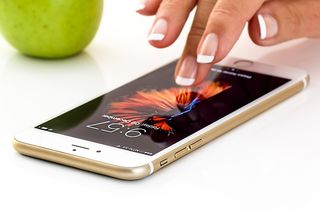Caregiving
Phone-Shaming and Admin Compassion
Ever get annoyed at someone for using their device? Me, too.
Posted August 15, 2019 Reviewed by Gary Drevitch

“Please put your phone away.” The teacher’s voice cut loud and sharp through the spacious yoga studio.
I looked up from my downward-dog pose. A woman was kneeling on her mat, right in the middle of the room, typing into her phone. The woman paused to glance at the teacher.
“Yes, you,” the teacher added, nodding in her direction.
Wow, I thought. This woman is actually using her phone during yoga class.
Then I had another thought: This woman is being phone-shamed.
Phone-shaming is common enough these days; I’ve certainly asked people to put their phones away, sometimes nicely, sometimes not so nicely. Worse, instead of using my words like a rational adult, I have also sometimes just glared fiercely, as if my eyes could shoot lasers to explode the offending device.
But I do hate when people use their phones at yoga. I don’t even like it when they leave their phones next to their mats. Don’t misunderstand me: I’m not anti-tech. I rely on my phone for a range of essential and non-essential functions.
But we should be able to escape to phone-free spaces. I go to yoga partly for this reason: I want to get away from my own phone and its demands and distractions. I’m also very happy not to see anyone else’s phone for an hour.

I’m persuaded by research suggesting that the brain’s bandwidth for complex tasks is decreased by the mere sight of a smartphone screen, even someone else’s. (I hope that just the mention of that image doesn’t dumb you down.)
Watching this woman get phone-shamed at yoga reminded me of a puzzle, though: Why is it that someone else hunched over a phone always looks to us to be doing something frivolous, like playing a game, or checking for fresh likes on Instagram—things that are decidedly not urgent.
This judgmental feeling has started to change for me, though, after studying life admin these past few years.
The office work of life is mostly invisible. This is partly because we do so much of our admin on our devices, making it pretty much impossible for someone else to know if we’re scheduling a doctor’s appointment (admin) or playing a game (like Sum, my current favorite).
Now that life admin is visible to me, I have a way out of phone-shaming.
That woman texting during yoga might be responding to a babysitter’s question—the babysitter whose presence enabled her to get to yoga in the first place.
“Do you want to take your phone outside, if it’s important?” the teacher asked.
“No, no, that’s OK,” the student responded, refusing to take the hint and instead continuing to tap tap tap...
Surely this woman should have taken her phone into the hallway to do her texting. It’s not easy to preserve spaces where we can all get away from devices for a while. A teacher is doing her job when she gently asks someone to take their texting outside.
I have no idea what this woman was actually doing, of course. Maybe it wasn’t anything essential. Maybe she was using Shazam to identify the music wafting through the studio (a defense I once heard from another phone-using student). But thinking about this day’s phone-user wasn’t making my warrior pose any easier. And getting angry at her wasn't helping anyone.
They say that holding on to your anger is like taking poison and expecting someone else to die. (They say this at yoga a lot, actually.) It's time to change course.

I began to imagine that the texting woman has a sick child. I pictured the woman needing this yoga class to keep up her energy, her stamina, for all-night caregiving. I imagined the babysitter needing to know something urgent, maybe the right dose of the child’s medicine.
With a little more imagination and seemingly endless warrior poses, I managed to escape my irritation and get back to my own practice.
Thank goodness for admin compassion.
Post Script: There are bigger problems in the world than phone-shaming. I wrote about some of them—and about how talking across the divide of privilege can help build admin compassion—recently. See Let’s Talk About Privilege.
Facebook image: By CREATISTA/Shutterstock
References
Bill Thornton et al., “The Mere Presence of a Cell Phone May Be Distracting,” Social Psychology 45, no. 6 (November 2014): 483–85.




